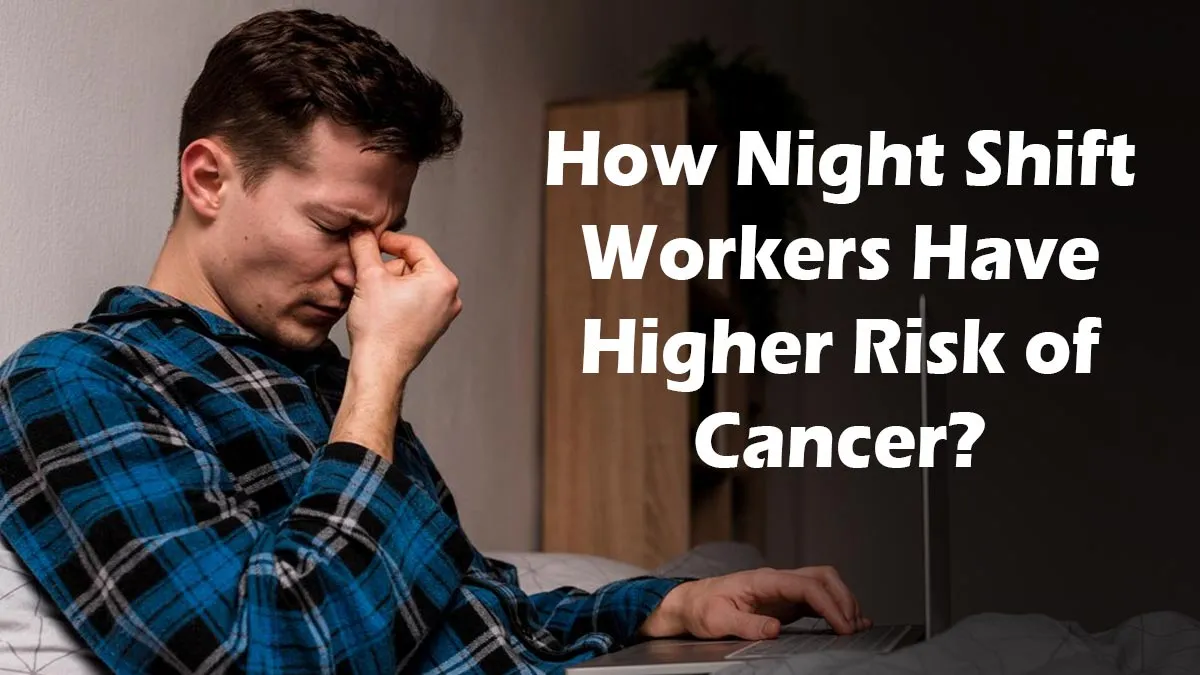
Working night shifts can mess up more than just your sleep. Studies show that people who work overnight jobs are more likely to develop serious health problems, including certain cancers. The World Health Organization (WHO) even calls shift work a “probable carcinogen” because of its links to prostate, breast, and colon cancers. This raises an important question: if night shifts are harmful, how can workers protect themselves without quitting their jobs? Let’s break down the risks and share practical tips to stay healthy.
Table of Content:-
How Does Night Shift Workers Have Cancer Risk?
-1739531295592.jpg)
Shane Creado, Integrative Psychiatrist, Amen Clinics, Chicago, explains the dangers of working irregular hours. “Shift work disorder isn’t just about feeling tired. It messes with your body’s natural rhythms, which can lead to long-term health issues,” he says. According to Dr Creado, night shift workers are more likely to develop cancers like prostate, breast, and colon cancer due to poor sleep and hormonal imbalances.
A 2019 study in the Journal of the National Cancer Institute found that women working night shifts for 20+ years had a 19% higher risk of breast cancer. Similar risks were seen in men with prostate cancer.
Why Night Shifts Harm the Body
Our bodies run on a natural “internal clock” called the circadian rhythm. This clock controls sleep, hormones, and even cell repair. Night shifts force the body to stay awake when it should rest, leading to:
- Darkness triggers melatonin, a hormone that fights cancer cells. Artificial light at night blocks melatonin production.
- Chronic Inflammation: Poor sleep increases inflammation, a key driver of cancer.
- Hormonal Imbalances: Disrupted sleep affects insulin, cortisol, and estrogen levels, all linked to cancer growth.
Practical Tips to Reduce Cancer Risk

The expert says quitting your job isn’t the only solution. Instead, focus on small changes to protect your health:
Stick to a Fixed Sleep Schedule
Sleep at the same time every day, even on weekends. “Your body loves routine,” says Dr. Creado. If you work nights, sleep during the day—but keep the schedule consistent.
Take Strategic Naps
Feeling sleepy during a quiet night shift? “Take a 20-40 minute power nap” he added. Short naps boost alertness without making you groggy.
Create a Sleep-Friendly Space
Daytime sleep can be tough. Use blackout curtains, an eye mask, and earplugs to block light and noise. Dr Creado also suggests relaxation techniques like meditation or magnesium supplements to calm the mind before bed.
Focus on Healthy Habits
- Eat balanced meals (avoid heavy snacks at night).
- Exercise regularly, but not right before sleep.
- Limit caffeine and screen time before bed.
The Bottom Line
Night shift work is a reality for millions, but it doesn’t have to harm your health. By understanding the risks and taking small steps, you can lower your chances of cancer and other illnesses. As Dr Creado says, “It’s not about being perfect—it’s about making smarter choices for your body.” Start with small changes today, and give yourself the best chance to stay healthy tomorrow.
Conclusion
Night shift work doesn’t have to mean sacrificing your health. By sticking to a consistent sleep schedule, taking strategic naps, and creating a sleep-friendly environment, you can reduce your cancer risk and feel better overall. Small, mindful changes can make a big difference. As Dr Creado says, “Your health is worth the effort—start today.” Prioritise self-care, and give your body the support it needs to thrive, even on night shifts. With better sleep habits and self-care, you can protect your health while keeping your job.
Also watch this video
How we keep this article up to date:
We work with experts and keep a close eye on the latest in health and wellness. Whenever there is a new research or helpful information, we update our articles with accurate and useful advice.
Current Version
